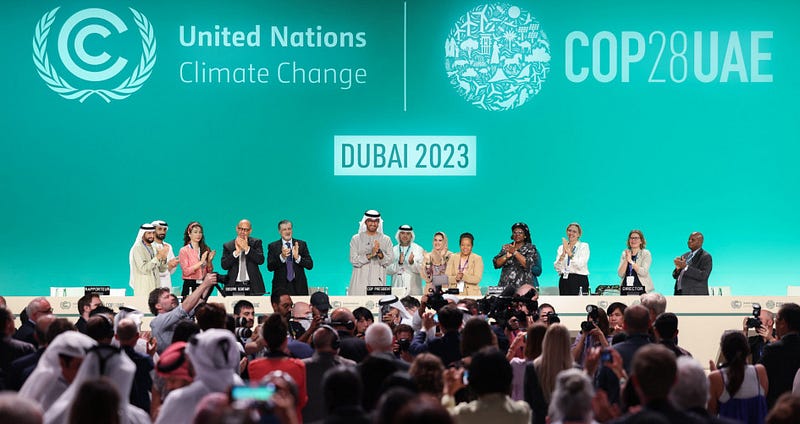Insights from COP 28: Breakthroughs, Challenges, and Debates
Written on
Chapter 1: Overview of COP 28
COP 28, held this week, was a significant UN climate change conference. Many experts argue that the outcomes do not sufficiently address the climate emergency, with commitments lacking in clarity and rigor. Just weeks before the conference, I shared my expectations, echoing a common sentiment that these gatherings often result in more discussions than tangible actions.
With the COP 28 event concluding and attended by around 85,000 participants in Dubai, I can now discuss the key results. This conference revealed a mix of achievements, setbacks, and ongoing debates surrounding climate action.
Section 1.1: Key Achievements
One of the most notable outcomes was the unanimous agreement among the 197 participating nations to "transition away from fossil fuels." This consensus, referred to as the "global stocktake," marks a significant milestone, as prior conferences had never established such a commitment.
This may come as a surprise, given the scientific consensus on the harmful effects of fossil fuel combustion dating back to 1896. It’s encouraging to see governments beginning to align with these scientific findings.
Subsection 1.1.1: The Challenge of Consensus

Achieving this agreement was no small feat, particularly given Dubai's status as a leading oil producer. A substantial contingent of over 2,500 fossil fuel lobbyists attempted to challenge this consensus, but ultimately, the nations involved reached an accord. Negotiating the phrasing was so complex that numerous all-nighters were required to finalize the text, which emphasizes a transition away from fossil fuels in a manner that is fair and orderly, aiming for net-zero emissions by 2050.
Section 1.2: Looking Ahead
Simon Stiell, the UN's climate change executive secretary, noted that while the fossil fuel era has not ended, this agreement symbolizes a significant turning point. The framework also includes calls for enhanced strategies to limit global temperature rises to below 1.5°C.
Chapter 2: Financial Commitments and Their Implications
The establishment of a long-awaited "loss and damage" fund, managed by the World Bank, is another achievement from COP 28. Wealthier nations, which bear the most responsibility for climate issues, pledged $700 million to support developing countries that have long sought such financial assistance. However, this amount represents a mere 0.2% of the economic damages caused by climate change in these vulnerable regions.
Moreover, the Green Climate Fund saw additional pledges from six countries, bringing the total to $12.8 billion. Nevertheless, these commitments still fall short of the estimated trillions needed for a sustainable energy transition for developing nations. The participating countries recognized the need for reform in global financial systems and new funding avenues.
Despite these advancements, many critics argue that the COP 28 agreement lacks ambition and specificity, particularly regarding financial support for green energy transitions. The phrase "transition away from fossil fuels" is viewed as a diluted commitment compared to the stronger terms of "phase out" or "phase down."
Section 2.1: The Call for Action
As Secretary Stiell pointed out, immediate action is crucial; governments and businesses must translate these pledges into real, impactful outcomes. This call for urgency has been echoed after every COP meeting, often with disappointing follow-through.
However, it's essential to recognize that the annual COP meetings play a vital role in shaping the narrative around climate change and humanity's responsibilities.
And Finally...
The majority of the attendees at COP 28 were part of an expanding global movement advocating for climate action. Stiell acknowledged this, emphasizing the importance of grassroots activism. He stated, “Your voices and determination will be more important than ever. I urge you never to relent. We are still in this race, and we will be with you every step of the way.”
This reflects the ongoing journey of learning and adapting as we strive for a sustainable future.

I’m a freelance writer and commercial blogger delivering content services to selective business-to-business marketing clients. I have extensive experience in content creation, technical writing, and training, working as a consultant and later in management roles with many of Canada’s most successful organizations. Specialties: Content Marketing, Social Media, Technical Writing, Training and Development. View all posts by David Morton Rintoul.
Originally published at http://daretoknow.ca on December 17, 2023.